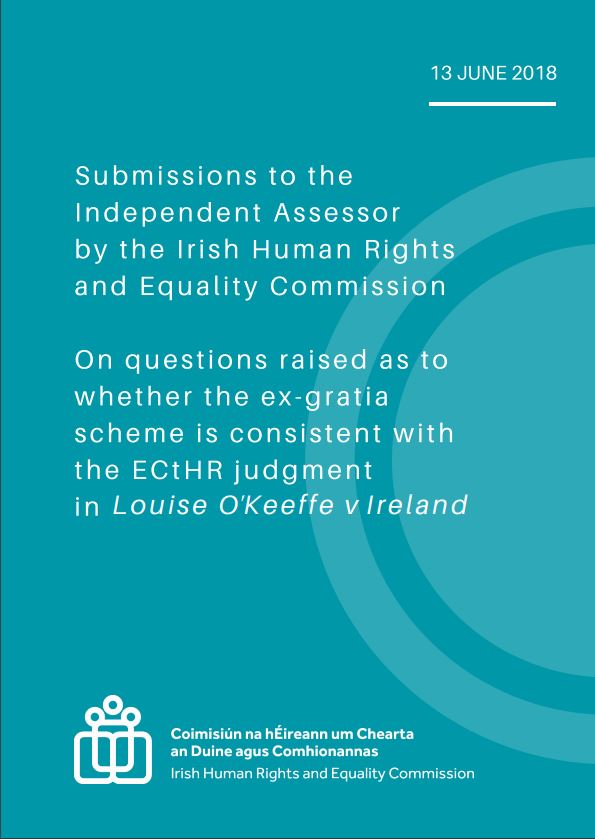The Irish Human Rights and Equality Commission (the Commission) has warned that victims of historic child sexual abuse in schools, many of whom should be considered as vulnerable, are still being forced through the Courts to secure their rights, due to the State’s narrow interpretation of the 2014 European Court of Human Rights (ECtHR) judgment in the case of Louise O’Keeffe.
The Commission has consistently, since 2015 used its legal standing, which affords national human rights institutions the opportunity to contribute to the execution of a ECtHR judgment to set out that the State has adopted an unduly restrictive and narrow approach to the category of “victim” in its interpretation of the ECtHR ruling.
Under the State’s restrictive interpretation of the O’Keeffe ruling, a victim of child sexual abuse is required to establish the existence of a prior complaint before the State’s liability was triggered. This narrow interpretation has seen only 7 cases settled by the State to date, with only 19 applications having reached the Independent Assessor since its announcement in July 2015.
The latest warning from the Commission was delivered in its June submission to the Independent Assessor Mr. Justice Iarfhlaith O’Neill in relation to claims for ex gratia payments arising from the O’Keeffe judgement. The Commission re-states its view “…that the State’s interpretation of the meaning of the O’Keeffe judgment and its implications in terms of the requirement of the State to provide a remedy, is not constructed on a firm or stable bedrock.”
The Commission sets out that the criteria adopted by Government to identify cases covered by the O’Keeffe judgment are based on a limited and narrow interpretation of the decision of the European Court of Human Rights.
In 2014 the Grand Chamber of the European Court of Human Rights ruled that the State had violated Articles 3 and 13 of the European Convention on Human Rights, had failed to fulfil its obligation to protect Louise O’Keeffe from inhuman and degrading treatment, and had failed to provide her with an effective remedy.
In October 2015, the Commission reported to the Council of Europe its concern over the State’s execution of the judgment. A further submission to the Council of Europe’s Committee of Ministers also followed in October 2016 on the State’s restrictive interpretation of the O’Keeffe v Ireland judgment. Most recently in June the Commission submitted its views to the Independent Assessor of claims.
Emily Logan, Chief Commissioner of the Irish Human Rights and Equality Commission, stated:
“The practical effect of the narrow position adopted by the Government in response to the O’Keeffe case has been to deprive people who suffered abuse as children within the national school system of an effective remedy.
“Louise O’Keeffe herself has described her fight for justice to secure the 2014 judgment of the European Court of Human Rights, which focused on the need to protect people who had suffered abuses as children from inhuman and degrading treatment, and to provide then with an effective remedy. Today however, we still see vulnerable people being forced through the Courts to vindicate those rights.”
“The Commission has consistently spoken out in its role as Ireland’s national human rights institution to see that judgments of the European Court of Human Rights concerning Ireland are fully implemented, and victims’ rights to redress are vindicated.”
ENDS/
For further information, please contact
Brian Dawson, IHREC Communications Manager,
01 8589601 / 087 0697095 bdawson@ihrec.ie
Follow us on twitter @_IHREC
Notes to editor
The full text of the Commission June 2018 submission to the Independent Assessor is available at the following link:
https://www.ihrec.ie/app/uploads/2018/09/Submission-by-IHREC-to-Independent-Assessor-1-2.pdf
The Commission’s October 2015 written submission to the Council of Europe under Rule 9 is available here
The Commission’s October 2016 written submission to the Council of Europe’s Committee of Ministers is available here:
In the case of O’Keeffe v Ireland (Application no 35810/09) the applicant, Louise O’Keeffe, had been sexually abused in 1973 while attending a school owned (through trustees) by a Roman Catholic bishop, and managed by a local priest. The abuse was carried out by the school’s principal teacher, who was an employee of the school manager.
In its decision of 28 January 2014 (available here), the Grand Chamber of the European Court of Human Rights held that the State had violated Articles 3 and 13 of the European Convention on Human Rights, in that it had failed to fulfill its obligation to protect Louise O’Keeffe from inhuman and degrading treatment, and had failed to provide her with an effective remedy.
Following the decision of the European Court of Human Rights in O’Keeffe, Ireland has been required to submit action plans to the Committee of Ministers on a periodic basis, outlining the individual and general measures adopted to implement the judgment of the Court. The Irish Human Rights and Equality Commission has previously made submissions to the Committee of Ministers in relation to the execution of the judgment in O’Keeffe. The State’s action plans, together with submissions made by the Irish Human Rights and Equality Commission and a number of non-governmental organisations, are available here: http://www.coe.int/en/web/execution/submissions-ireland
Irish Human Rights and Equality Commission
The Irish Human Rights and Equality Commission is an independent public body, appointed by the President and directly accountable to the Oireachtas. The Commission has a statutory remit set out under the Irish Human Rights and Equality Commission Act (2014) to protect and promote human rights and equality in Ireland, and build a culture of respect for human rights, equality and intercultural understanding in the State.
The Irish Human Rights and Equality Commission is Ireland’s national human rights institution and is recognised as such by the United Nations. The Commission is also Ireland’s national equality body for the purpose of a range of EU anti-discrimination measures.
